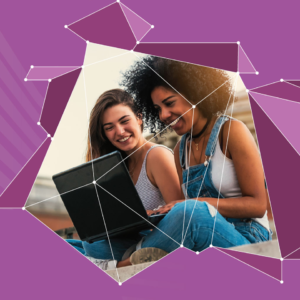What is a virtual exchange? Maybe not what you think. We’ll be digging deeper into that in this special edition of Absolutely Intercultural coming to you from Denmark. My name’s Anne Fox and this is show 232. Today’s show is mainly about promoting dialogue between different groups of people. So what is dialogue? And can you tell the difference between dialogue and, for example, debate?
Tag: European Union
Absolutely Intercultural 216 +++ Erasmus 30 Anniversity +++ Practical Teaching +++ Study Abroad
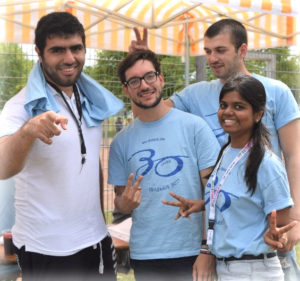 Welcome to show 216 of our podcast “absolutely intercultural” which is the second of a series of “Erasmus podcasts” to celebrate and highlight the 30th anniversary of this “mother of all student exchange programs”. In this episode we are going to hear from the three participants of the program sharing their dearest experiences and stories with you. What is it like to be an Erasmus student? What is is an “Erasmus Experience”? Perhaps living on your own in completely different country for the first time! Stay tuned and listen to our international exchange students from Azerbaijan and Spain, as well as a guest lecturer from Canada.
Welcome to show 216 of our podcast “absolutely intercultural” which is the second of a series of “Erasmus podcasts” to celebrate and highlight the 30th anniversary of this “mother of all student exchange programs”. In this episode we are going to hear from the three participants of the program sharing their dearest experiences and stories with you. What is it like to be an Erasmus student? What is is an “Erasmus Experience”? Perhaps living on your own in completely different country for the first time! Stay tuned and listen to our international exchange students from Azerbaijan and Spain, as well as a guest lecturer from Canada.
Brexit +++ EU referendum +++ citizenship test +++ Absolutely Intercultural 208 +++
 In this show we will be talking about the UK referendum to leave the EU and some of the consequences it has had.
In this show we will be talking about the UK referendum to leave the EU and some of the consequences it has had.
Many of the people that the referendum result would affect most did not have a vote and we talked to two of those. Once the result was announced there were reports about immigrants being abused and attacked. This made Ania, a Pole living in Scotland, a bit more careful when phoning home. And what about Britons who have moved to other EU countries. Will their status be safe? Gwen is a Briton who has lived her whole life in Denmark. Two years ago Denmark changed its law to allow dual nationality so Gwen decided she would like a Danish passport alongside her British passport.
Continue reading “Brexit +++ EU referendum +++ citizenship test +++ Absolutely Intercultural 208 +++”
absolutely intercultural 162 +++ South Africa +++ UniKey +++ Mhadi A Thavha +++ Hlokomela +++
Firefox users please try another browser so that you can access the audio player.
If you like the podcast then LIKE US ON FACEBOOK HERE!
The sound we started with was an instrument made by Thomas Kubayi who sculpts, drums and plays music and who gave my daughter a sculpting lesson when my family stayed in the Limpopo region of South Africa last year. It just so happens that I am working with a South African partner in a European project, the Uni-Key project, so I was very excited to meet Marié-Tinka Uys on her home turf when she showed me round some of the many projects which abound in her region of South Africa which is centred on Hoedspruit just outside the famous Kruger National Gamepark. The UniKey project is about supporting university interns who choose to do their internship in small enterprises rather than the large well-known companies. This means that the interns have a better chance of working with the founder of the company and get a better feel for the entrepreneurial skills needed to run a company. Europe is starting to send interns outside the EU, for example to South Africa, and there are plans for promoting exchanges in the other direction too with South Africans able to do internships in Europe. The UniKey project has developed an online course for the interns to follow and what we needed from our South African partners was some feel for how well our online course would travel outside of Europe. For example when we talk about marketing and partnerships in the UniKey course, is our definition wide enough to encompass the African way of doing things? What about our definition of business even? Marcelle Bosch, a Dutch woman and former aid worker, has her sustainable tourism lodge business, Madi A Thavha where we stayed a few days. Can you make a living employing the former farm workers that gained their livelihood from the land that you just bought? I also spoke to Costas who works for a clinic supported by the farms, which in South Africa, are huge concerns employing thousands of workers who often live on site. This is very different to farming in Europe which is highly mechanized with very few employees. And while we in Europe depend on a universal health service paid for through taxation, South Africa is facing the HIV and Aids epidemic which affects mainly adults in their prime, so health projects are often centred around the workplace as in the case of the Bavaria farm I visited near Hoedspruit where the clinic is financed partly by the employers and partly by community efforts. We’ll also be hearing a new perspective on how to improve the status of women and how European experts can’t always cope with the differences they meet in the African context. Welcome to Melina, Akos and Omar who are the latest people to like our Facebook page.
absolutely sustainable
So let’s start at Madi a Thavhi by seeing how we can be absolutely sustainable in the Limpopo region of South Africa on a former farm near Louis Trichardt or Makhado as the town is also known. And by the way, why towns have two names in South Africa is a whole other story which we could discuss on the Absolutely Intercultural Facebook page if you want to know more.
absolutely positive
So that was an example of how to look after your employees in a small scale business and now you can hear the sound of my daughter having a go at sculpting wood with renowned local artist, Thomas Kubayi. While I was in South Africa I had the chance to discover that there is a wide range of community organisations working hard with the big employers to provide all sorts of health, education and other benefits for their employees. So this means that instead of local government or public sector provision, there is a much more local and volunteer based-coverage in South Africa. In the Hoedspruit area the two businesses I heard most about were the game lodges and the farms. So my next visit was to a clinic based on a fruit farm which treats mainly HIV and AIDs patients through the Hlokomela project. In speaking with Costas I learned that when you are HIV positive, a key indicator you need to look at are your CD4 levels and I also learned that, at least on this farm, the disease can be managed so that there are reasons to be absolutely positive!
absolutely equal
As I was driven around the projects by Marié-Tinka Uys my eye was drawn to a set of murals painted on the wall of the Bavaria farm showing desirable male behavior such as not drinking and not using physical violence against your wife. When I asked Marié-Tinka about these she gave me a surprising solution about how to affect gender roles.
absolutely tasty
Marié-Tinka also talked about another part of the Hlokomela project which is an organic herb garden which has been started to supply the many game lodges in the Hoedspruit area. As we were talking she mentioned why interns should come alone and gave one example where the foreign expertise just could not cope with the differences experienced in South Africa.
Thanks to everyone who was willing to speak to me in South Africa and especially to Marié-Tinka Uys who introduced me to the wealth of activity going on in her area. She literally opened doors and gave me a peek into so much, which, as a tourist I would never have experienced. Thanks also to the UniKey project for giving me the opportunity to wonder about how people do business in other parts of the world. Who knows? This might even be the start of your own African internship adventure?
absolutely Amazon
And if you want even more background as to broader issues behind what people were telling me about in this podcast then you might consider visiting the Absolutely Intercultural Amazon store here where we have both classics, basics and specifics for sale, a small proportion of which goes to us to support the costs of maintaining this podcast. You don’t pay any more to buy them through our store and every purchase contributes a little to the running costs of the podcast so if you’re thinking of buying, consider using our new store. There is a permanent link at the top of this blog page.
Our next show will be coming to you from Dr. Laurent Borgmann on February 1st so stay tuned!
The host of this show is: Anne Fox
Editing done with the help of Hindenburg Journalist Pro
absolutely intercultural 160 +++ entrepreneurship +++ critical thinking +++ intensive seminar +++ Lithuania +++
Firefox users please try another browser so that you can access the audio player.
If you like the podcast then LIKE US ON FACEBOOK HERE!
Did you know that if you are a student in a European University you are able t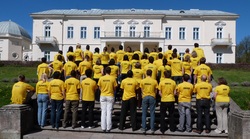 o take part in an intensive seminar with students and lecturers from all over the EU? We’ll be hearing from some students who took part in one such seminar in Lithuania earlier this year. Did you follow Karsten Kneese on Twitter last month? Karsten took over the ’I am Germany’ Twitter account for a week early in October. One thing I learnt about during that week was the German work canteens which are open to the public. So what do you think of this as a way of representing a country? You can add your comments to our blog here or on our Facebook page. Thank you An, Vian, Sammy, Katherine and Roman who are the latest to have liked us there.
o take part in an intensive seminar with students and lecturers from all over the EU? We’ll be hearing from some students who took part in one such seminar in Lithuania earlier this year. Did you follow Karsten Kneese on Twitter last month? Karsten took over the ’I am Germany’ Twitter account for a week early in October. One thing I learnt about during that week was the German work canteens which are open to the public. So what do you think of this as a way of representing a country? You can add your comments to our blog here or on our Facebook page. Thank you An, Vian, Sammy, Katherine and Roman who are the latest to have liked us there.
So in May, 35 students and lecturers from all over Europe gathered together in Lithuania to work together for two weeks on an intensive seminar about entrepreneurship called RECEIVE. The topics explored included marketing, intercultural differences, digital communication, coaching and critical thinking. Critical thinking not only has an application to entrepreneurs but is also an important skill for students who have been taught in quite a different way across the world.
absolutely critical
I talked first to Serge Koukpaki from Edinburgh University, which attracts many international students each year, about why he teaches a course on critical thinking and the effect on his foreign students. Then I talked to three of the students Serge brought with him to participate in the RECEIVE project who came from China, Thailand and Tanzania to find out what they thought of bringing a diverse group together to create joint products. Guangqian Li from China spoke about his experience of working in a multinational group. I was certainly surprised to learn that this intensive seminar in Lithuania was Li’s first experience of a truly multicultural educational setting. Didn’t he have that in Edinburgh I wondered? Next I spoke to Duanjam Surbpong or Mo for short from Thailand about the benefits of the Intensive programme; extending your network is certainly a useful entrepreneurial skill. My final interview was with Hassan Iddy, a teacher trainer from Tanzania who found that the communal living aspect of the project reminded him of life in Tanzania much more than in Edinburgh where he is currently studying for his Masters.
absolutely challenging
So far we’ve heard a lot of good things about the Receive project but there were also a few challenges. For example the group visited holocaust memorial museums while in Lithuania which lead to a discussion on genocide and the question about whether China’s one child policy could also be classed as genocide. For Li, whom we heard from earlier, this was a problem as he explains. And that wasn’t the only challenge. In my own workshop where we were constructing the project website, we suddenly noticed after about four days of work that all the personal photos on the website were of males. This was quite a shocking realization which lead us to review all the photos on the website as well as discussing how this could have happened. In fact it wasn’t just about photos. You may have noticed that all my interviewees in this pod cast were also male. So lots of food for thought.
absolutely entrepreneurial
If you are interested in following up the cross-border entrepreneurial theme you can join me in the free online Global Education conference on Monday 12 th November at 18:00 GMT when I’ll be showing a way of helping interns make more of their foreign posting through online skills training. All details and links will also be on our Facebook page.
absolutely Amazon
And finally don’t forget that if you are interested in following up any aspect of intercultural communication we have put together a collection of books, old and new, theory and practical in the Absolutely Intercultural Amazon book store. You don’t pay any extra but we get a small contribution to help continue pay the expenses of this podcast. Now that the northern nights are drawing in, a book may be just what you need here! You don’t pay any more to buy them through our store and every purchase contributes a little to the running costs of the podcast so if you’re thinking of buying, consider using our new store. There is a permanent link at the top of this blog page.
Our next show will be coming to you from Dr. Laurent Borgmann on December 7th so stay tuned!
The host of this show is: Anne Fox
Recordings done on my iPad and editing done with the help of Hindenburg Journalist Pro
absolutely intercultural 157 +++ CSR +++ students view +++ real life projects +++ community work +++ school children +++ elderly people +++
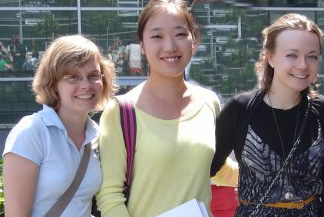 Today I would like to pick up the topic of your last show. We talked about CSR which stands for “Corporate Social Responsibility”. In times of global markets and increased business competition, Small and Medium sized Enterprises must find a way to increase their competitive edge. Therefore they often try to save costs as a result of competitive conditions and market instabilities. However, maybe a cultural change in companies will give them a competitive advantage? Implementing and practicing CSR may lead to increased costs and you may not see the benefits immediately. So why do successful companies go in that direction? Apparently around 50% of American and European SMEs believe that CSR-activities are somewhat effective for their business. SMEs can change their company culture and provide significant benefits by investing in small, efficient projects in society to increase their own visibility in the community. Some companies may do something good for the environment or donate money and others might start working in close cooperation with Non-Profit and Non-Governmental Organizations. This time I would like to approach the topic from a different angle. CSR is becoming more and more important in business life and thus future managers should have a solid knowledge about it. In previous shows I talked to CSR specalists such as lecturers from different European universities and employees of companies which have implemented CSR in their business plans. Our focus was to find out how CSR work changes the culture within the company but also the contacts between a company and its stake holders. Today my focus is on students and what they learn about CSR during their studies of Business Administration. I interviewed students from Hungary, Russia, and Mongolia who dealt with corporate culture and CSR in their last semester at RheinAhrCampus in Germany in one of my courses called “International Business Simulations”.
Today I would like to pick up the topic of your last show. We talked about CSR which stands for “Corporate Social Responsibility”. In times of global markets and increased business competition, Small and Medium sized Enterprises must find a way to increase their competitive edge. Therefore they often try to save costs as a result of competitive conditions and market instabilities. However, maybe a cultural change in companies will give them a competitive advantage? Implementing and practicing CSR may lead to increased costs and you may not see the benefits immediately. So why do successful companies go in that direction? Apparently around 50% of American and European SMEs believe that CSR-activities are somewhat effective for their business. SMEs can change their company culture and provide significant benefits by investing in small, efficient projects in society to increase their own visibility in the community. Some companies may do something good for the environment or donate money and others might start working in close cooperation with Non-Profit and Non-Governmental Organizations. This time I would like to approach the topic from a different angle. CSR is becoming more and more important in business life and thus future managers should have a solid knowledge about it. In previous shows I talked to CSR specalists such as lecturers from different European universities and employees of companies which have implemented CSR in their business plans. Our focus was to find out how CSR work changes the culture within the company but also the contacts between a company and its stake holders. Today my focus is on students and what they learn about CSR during their studies of Business Administration. I interviewed students from Hungary, Russia, and Mongolia who dealt with corporate culture and CSR in their last semester at RheinAhrCampus in Germany in one of my courses called “International Business Simulations”.
absolutely young
In our first category I asked Katalin Perjési from Hungary what she thinks about CSR and what she learnt on the course. She will tell us about a project where the students designed and implemented their own CSR projects for the university. They invited school children to the campus to teach them about respect and diversity in the community. Some said afterwards that they walk past the university every day but had never dreamed of spending a day inside before they reach their A-levels. As these were school children who often get taught in classes with many national backgrounds it was not so surprising, how much they already knew about diversity, respect for different cultures and dealing with other children who do not have the same first language.
absolutely green
I interviewed Nadya Kokareva from Russia. She will tell us about the vague ideas people have about CSR and gives us some examples of how a university could practice CSR. This is not exclusively about institutions “going green”, which means saving the environment. Nadya also took part in the course and participated in another project. This time, the target group were not the children in the community, but the elderly people who live in a nursing home just 800 metres from campus. In spite of the proximity, the students who took part in the project had never visited the home.
absolutely courageous
Oyunbileg is an exchange student from our Turkish partner university in Izmir. However, she is originally from Mongolia and is currently doing her Erasmus semester abroad. In our last category she will talk about her theoretical lectures on stakeholder relationships and relates the theory to the practical CSR projects she was involved in last semester. Finally she gives us an idea of the cultural differences she experienced moving between Mongolia, Turkey and Germany.
Our next show will again be coming to you on 7 of September.
Until then –
Bleiben Sie absolut interkulturell!
The host of this show is: Dr. Laurent Borgmann
Editor: Markus Scherer
![]() Download
Download
![]() Podcast-Feed
Podcast-Feed
![]() iTunes-Abo
iTunes-Abo
absolutely intercultural 153 +++ South Korea +++ Germany +++ Semester abroad +++ Ideal student +++ Personal development +++
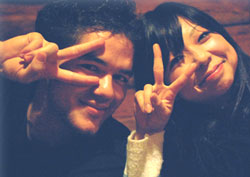 Today I am going to talk about the exciting decisions of those students who broaden their horizons by studying abroad. Furthermore we will talk to an expert who helps these students get the right information and financial support for fulfilling their dreams of living and studying in another country. Last but not least I would like to share an urban myth about an intercultural incident on a British Airways flight complete with a happy ending (at least for some of the people involved!)
Today I am going to talk about the exciting decisions of those students who broaden their horizons by studying abroad. Furthermore we will talk to an expert who helps these students get the right information and financial support for fulfilling their dreams of living and studying in another country. Last but not least I would like to share an urban myth about an intercultural incident on a British Airways flight complete with a happy ending (at least for some of the people involved!)
absolutely remarkable
In Germany it is normal for about 20% of students at universities go abroad during their studies. However, Anne Gründer, is rather special in many ways. She studied Biomathematics and chose to spend a semester studying abroad at EWHA Woman’s University in Seoul, South Korea. And because she enjoyed her time so much she actually extended her stay for a second semester. Anna also successfully learned the language with the Asian symbols that look so unfamiliar to the western eye. Now that she is back in Germany she looks back on the cultural differences she experienced and shares how she benefited from her stay. In our first category she will start by telling us why she chose South Korea as her destination for her semester abroad.
absolutely courageous
If one of our listeners is toying with the idea of coming to Germany, our interview will be particularly interesting for you. Kata Perjési is an Hungarian student. After spending a study semester abroad in Finland, she had planned to do her internship in Finland too. However, luckily for us she ended up being our new intern here at RheinAhrCampus. Kata is from Corvinus University in Budapest and will stay here for six months. In our next category she is going to tell us, why she chose Germany as her destination and what benefits she expects to get out of her stay abroad.
absolutely ideal
Our last guest for today is Wolfgang Kräft. He is working for the “German Academic Exchange Service or DAAD”. Together with his team, one of Wolfgang’s jobs is to travel through Germany and to inform German students how they could study abroad and which financial support they can get. They stop in bigger cities with their go-out mobile bus and provide students with a lot of information. In our last category Wolfgang will tell us what the ideal study abroad student should look like, how students can receive information about a semester abroad and finally he will give us advice on how your stay abroad could be the most productive time of our studies.
absolutely funny
Let me finish today with an intercultural urban myth about a black man and a white woman – a story has turned into a well-copied piece on the internet over the last decade. According to different versions this incident would have happened on about 17 different Airlines which is not very plausible but the story is nice enough to be re-told here:
“A 50- year old white woman on a British Airways flight arrived at her seat and saw that the passenger next to her was a black man. Visibly furious, she called the air hostess.
“Whats the problem, ma?” the hostess asked her
“Cant you see?” the lady said – “I was given a seat next to a black man. I can’t sit here next to him! You have to change my seat”
– “Please, calm down” – said the hostess
“I think, all the seats are occupied, but I`m still going to check if we have any.”
The hostess left and returned some minutes later.
“Madam, I spoke to the captain and he confirmed that there isn`t any empty seats in the economy class. We only have seats in the first class.”
“Look, it is unusual for our company to allow a passenger from the economy class be upgraded to the first class. However, given the circumstances, the captain thinks that it would be a scandal to make a passenger travel sat next to an unpleasant person.”
And turning to the black man, the hostess quickly said:
“Which means, Sir, if you would be so nice to pack your hand luggage, we have reserved you a seat in the first class…”
And all the passengers nearby, who were shocked to see the scene started applauding, some giving standing ovations.”
Adapted from: http://www.thatsnonsense.com/view.php?id=1481
Our next show will be coming to you from Anne Fox in Denmark on 4 May.
Until then –
Bleiben Sie absolut interkulturell!
The host of this show is: Dr. Laurent Borgmann
Editor: Markus Scherer
![]() Download
Download
![]() Podcast-Feed
Podcast-Feed
![]() iTunes-Abo
iTunes-Abo
absolutely intercultural 143 +++ ERASMUS special +++ Experience Report +++ EU-placements +++ Internship +++
 Today, we present a show which is going to focus on the European Program called “ERASMUS”, named after Eramus of Rotterdam. However, the name also stands for “EuRopean Community Action Scheme for the Mobility of University Students”. So, University students can apply for ERASMUS grants when they want to study abroad withinin Europe. Therefore we will hear different opinions about this mobility program and the opportunities students gain by studying abroad within the ERASMUS framework. Nowadays it is more and more important for students to internationalize themselves during their studies. This means they have to leave their comfort zones and broaden their horizons by studying abroad. In order to initiate this process, the European ERASMUS program was founded almost 25 years and has been giving out grants for the internationalization of students.
Today, we present a show which is going to focus on the European Program called “ERASMUS”, named after Eramus of Rotterdam. However, the name also stands for “EuRopean Community Action Scheme for the Mobility of University Students”. So, University students can apply for ERASMUS grants when they want to study abroad withinin Europe. Therefore we will hear different opinions about this mobility program and the opportunities students gain by studying abroad within the ERASMUS framework. Nowadays it is more and more important for students to internationalize themselves during their studies. This means they have to leave their comfort zones and broaden their horizons by studying abroad. In order to initiate this process, the European ERASMUS program was founded almost 25 years and has been giving out grants for the internationalization of students.
absolutely basic
In our first category Adelheid Korpp is going to tell us, what the program is about and which preparations students have to make. She is an expert on the ERASMUS program. She is responsible for the so-called “incoming students” at RheinAhrCampus and she knows a lot about the grants. She will tell us which countries in Europe take part in the ERASMUS program and what benefits student can expect if they decide to go on an ERASMUS exchange. For good Europeans it is essential to understand each other better particularly in context of the recent discussions about financial solidarity between the European member states.
absolutely experienced
In our second category Timo Schneider will share his experiences with us. He is back from his stay in Worcester, England, where he studied at a partner university of RheinAhrCampus. He will tell us how he heard about the program, what motivated him to put in an application, and of course which benefits he got from his stay. Timo also shares some of his intercultural experiences in sports where he noticed that his previous stereotypes really did not help. He will also give us a very useful advice.
absolutely working
In our last category Carsten Ritterath a student of business administration reports about his preparation for an internship in England. His football coach helped him find the English organisation where one of his tasks was to compare English and German approaches to health management in companies. Carsten managed to get a grant from ERASMUS-placements and he tells us what he needed to do in order to apply for this. He wrote a letter of motivation, a curriculum vitae, he took part in an intercultural seminar and he had to pass an English test. I took this interview with Carsten some time ago so in the meantime he is already back from his very successful ERASMUS stay.
Our next show will be coming to you from Anne Fox in Denmark on 16 September
Until then –
Bleiben Sie absolut interkulturell!
The host of this show is: Dr. Laurent Borgmann
Editor: Markus Scherer
absolutely intercultural 137 +++ National Youth Orchestra Of Iraq +++ Marketing Project +++ New European Mobility Law +++
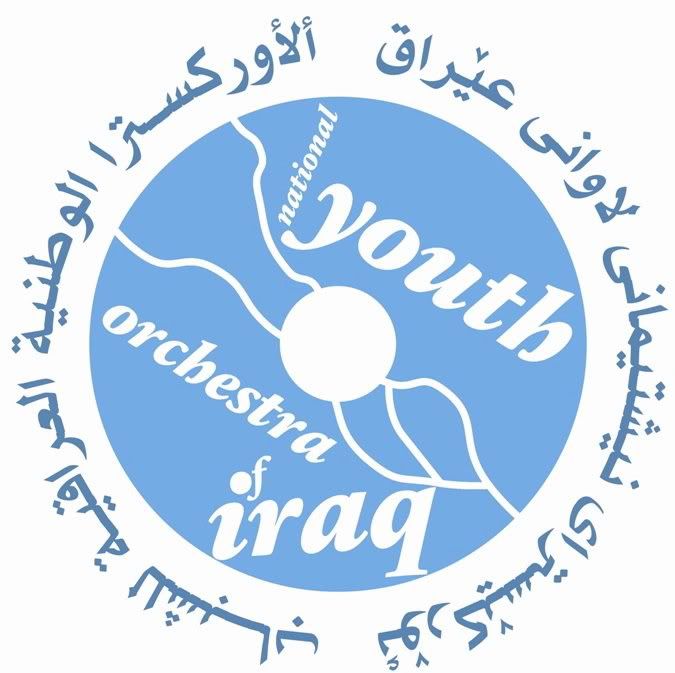
“The National Youth Orchestra of Iraq” is an inspiring project led by musical director Paul MacAlindin which is going to play in Bonn, Germany, on 1 October in the context of the Beethovenfest. In show 135 I interviewed Paul about the project itself. Now I am talking to some of the supporters of his project. On the one hand there is Prof. Karin Wolf, who plays the violin and is helping the players to improve and on the other hand there are two students from RheinAhrCampus who are also playing their role in the project.
absolutely open
Karin Wolf, a professor of viola, will share her experiences with us. She tried to collect musical instruments for the orchestra. Karin asked at her school whether people would have instruments which are no longer used and which could be donated to this international project. Furthermore she supported Paul and now she is helping the viola players to improve. In this interview she will share her motivation with us and the reasons why she is taking part in the project.
absolutely professional (part I)
Lucy Warren, our committed exchange student from Australia and co-worker in the International Office, will interview Nadya Kokareva from Russia. They are both involved in the “National Youth Orchestra Of Iraq” project. Nadya is also a participant of the university course “International Business Simulations” at RheinAhrCampus. Nadya will tell us in a first part how quickly her university course and the simulated company turned into a realistic one with a customer, what the students are doing for this customer and how they support the “National Youth Orchestra of Iraq”.
absolutely political
I would like to share a commentary given by one of my university colleagues about a political change which has affected Europe during the last few months. Two students from RheinAhrCampus, Marc Friedrich and Andrea Edel, interviewed Heinz Schaumann a university lecturer and expert in European institutions and law. Marc asked about the newest political developments in Europe; the recent changes in mobility law which were widely discussed in Germany. The countries in Europe have gradually opened their borders to the labor market. Especially those countries which followed the 2-3-2 rule are now the focus of European attention. This rule was made to somehow protect the labor markets of Western European countries for 7 years from workers migrating from East to West. Heinz Schaumann is in a very good position to give us a report about what happened and about the future prospects, for example the advantages and disadvantages for the “old” countries of the European Union.
absolutely professional (part II)
The Arabic and Kurdish players of the orchestra will leave their country in September, albeit, only for a short period of time and will travel to Germany. They will have to abandon their intercultural comfort zones by leaving their home country and coming to a foreign country with a very different culture, to play music in a multi-ethnic orchestra. In our last category Nadya tells us in the second part of the interview what specific role she held in the project and in the simulated company and what YOU, the audience, could do, to support the Orchestra, too! If you are interested in the way the exchange students are involved in the project, you can also follow them on their blog.
Ways to support “The National Youth Orchestra of Iraq”:
YOUTUBE: 1. NYOI plays for kids, 2. General Information, 3. KICKSTARTER
FACEBOOK: 1. German, 2. International
We hope we can motivate some of you to help support the “Youth Orchestra” with their project and their trip to Europe!
Breaking News: Saudi Arabian women want to be allowed to drive on their own! You can get to know something about their situation on Youtube and on their blog! Enjoy!
Our next show will be coming to you from Anne Fox in Denmark on 24 June
Until then –
Bleiben Sie absolut interkulturell!
The host of this show is: Dr. Laurent Borgmann
Editor: Markus Scherer
absolutely intercultural 131 +++ changing perspectives +++ annoying behaviour in class +++ hospitality club +++ freezing in Australia +++
 Why do different people have different perspectives? How can the same person have different perspectives on traffic only because one time the person experiences it in the car and the next day on a bicycle? How do our perspectives on events change over time. How big is the cultural influence on our perspective? And how does our perspecive change when we move to another culture?
Why do different people have different perspectives? How can the same person have different perspectives on traffic only because one time the person experiences it in the car and the next day on a bicycle? How do our perspectives on events change over time. How big is the cultural influence on our perspective? And how does our perspecive change when we move to another culture?
absolutely changed
All of us have different perspectives on the everyday things that surround us, we watch news on television, hear stories and we think we are perfectly informed about everything. But are we really? Sometimes a trip to another country or a new episode in our lives can change our perspective on the World dramatically.
Take Paul MacAlindin for example. He moved from small-town Scotland to big-town Germany and this move changed his geographical perspective to one which for Continental Europeans seems very normal.
absolutely irritating
Emese Bognar an exchange student from Hungary, vividly illustrates different perspectives and changing perspectives when she told me what irritated her when she attended a lecture and how her perspective on traffic changed, when she did her driving license.
absolutely hospitable
Agnes Dus from Hungary interviewed Adelheid Korpp, who had tried the “hospitality club”, which is a clever system for travelers to get cheap accommodation. The traveler applies for accommodation to a host, contacts the host and asks if they can stay for 1 or 2 nights. This seems to be a pleasant way for travelers to get around and have a cheap bed for the night. However, more importantly, this could be a good way to change your perspective from that of a regular tourist to that of a dear friend invited to the country. But let us listen to Adelheid how this works in detail, because first of all you need to get approved.
absolutely freezing
In our fourth and last category Roman told me about his time in Australia; he spent a semester at the University of the Sunshine Coast in Queensland and we now really have to change our perspectives here, because he is telling us that in the middle of the Australian summer you can still feel pretty cold, but listen to him yourself.
Our next show will be coming to you from Anne Fox in Denmark on 01 April
Until then –
Bleiben Sie absolut interkulturell!
The host of this show is: Dr. Laurent Borgmann
Editor: Dino Nogarole

